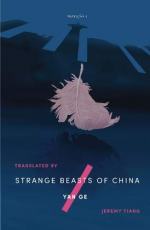
|
| Name: _________________________ | Period: ___________________ |
This test consists of 5 multiple choice questions, 5 short answer questions, and 10 short essay questions.
Multiple Choice Questions
1. What two rivers run through the city the narrator lives in?
(a) Loving and Narrow.
(b) Lotus and Peacock.
(c) Straight and Bering.
(d) Mississippi and Harington.
2. What do flourishing beasts make their livings as?
(a) Therapists.
(b) Gardeners.
(c) Lawyers.
(d) Doctors.
3. Who suspects that the narrator is in great danger with the impasse beast?
(a) Her priest.
(b) Her brother.
(c) Her professor.
(d) Her mother.
4. Where did the narrator first meet Charley?
(a) University.
(b) He was her neighbor.
(c) He was her dog walker.
(d) Her first job at the cafe.
5. Who is the narrator very close to, but also has a contentious relationship with?
(a) Her sister.
(b) Her mother.
(c) Her professor.
(d) Her brother.
Short Answer Questions
1. When was the first sighting of a joyous beast?
2. Where did many of the sorrowful beasts work for years?
3. Why are the animals that are outlawed in the city outlawed?
4. Where did the impasse beasts originally come from?
5. What are flourishing beasts by nature?
Short Essay Questions
1. What kind of relationship does the narrator have with her professor?
2. What does Cloud do to Lefty that is unexpected and horrific?
3. In Part I, what does the narrator's professor tell her might have happened to the male sorrowful beast Cloud?
4. What is the nature of sorrowful beasts?
5. How does Lefty "tame" the sorrowful beast?
6. Why are birds illegal to have as pets?
7. What does the narrator's professor say about joyous beasts when she asks him about the picture in the paper?
8. Why does the narrator feel guilty about her role in the killing of the sacrificial beasts?
9. How did being in close contact with a joyous beast seem to affect the mayor of Yong'An?
10. What do humans decide to do with the remainder of the sacrificial beasts in Part II?
|
This section contains 581 words (approx. 2 pages at 300 words per page) |

|




